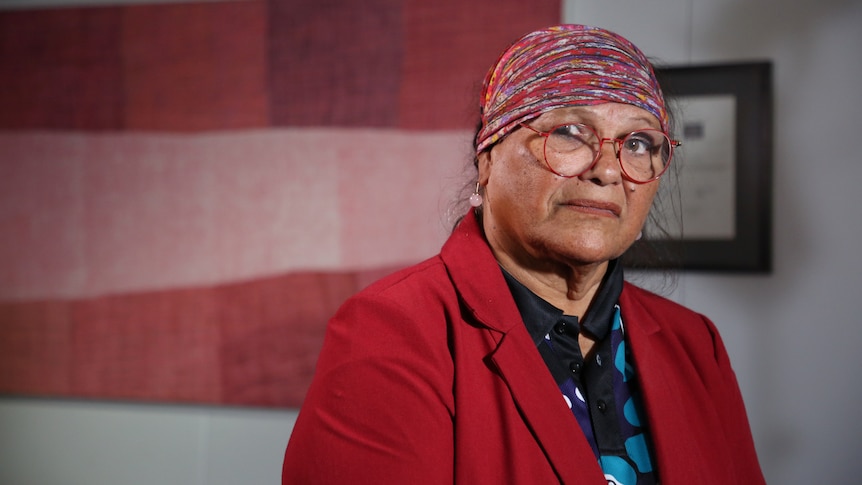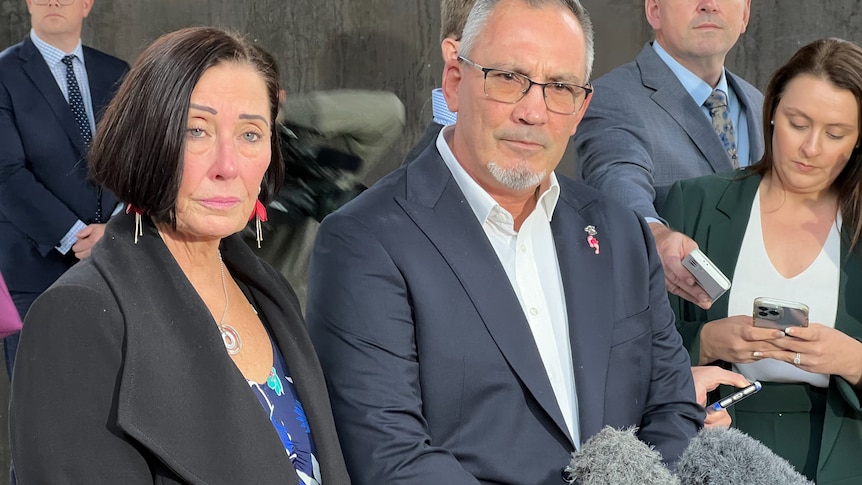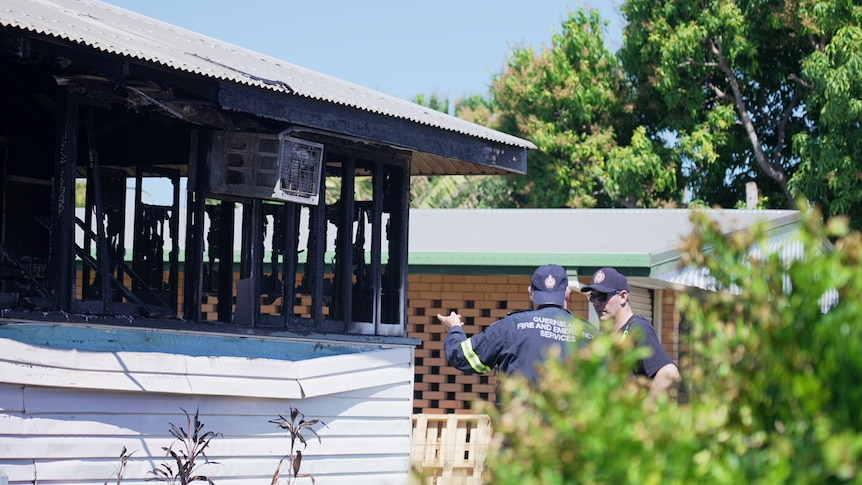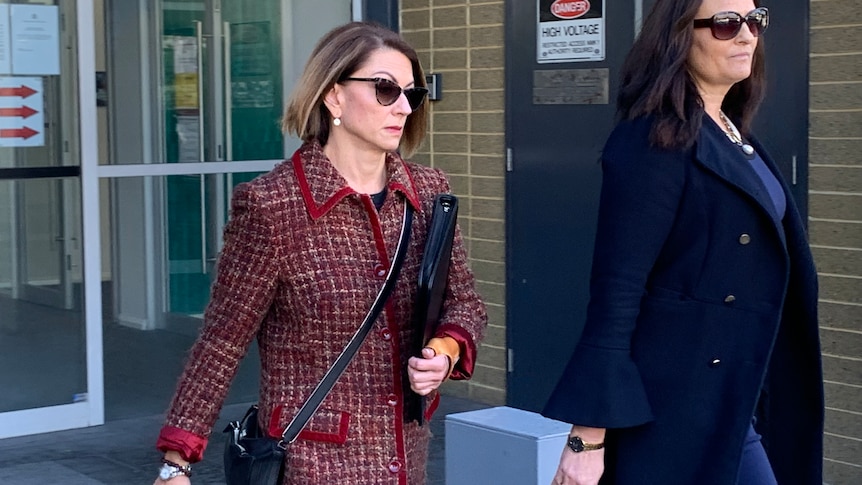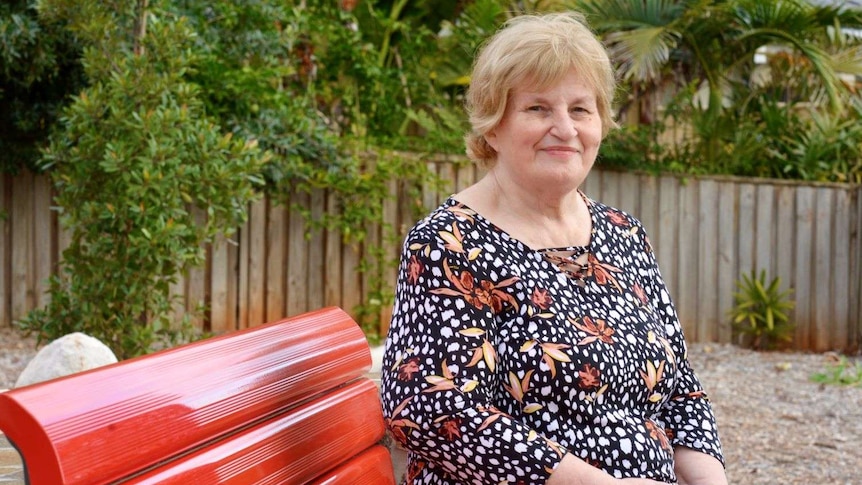In other communities Kathryn Drummond had worked in, domestic violence shelters were a haven for women and children in crisis.
Key points:
- A women’s safe house has never been funded for Timber Creek and surrounding communities
- Police and health services have to transport victims out of the region, traveling six hours at a time
- Other residents say they resort to taking domestic violence victims into their own homes
In Timber Creek, where she treated a woman from a nearby community who had been beaten by her partner earlier this year, a terrible thought crossed her mind.
“I started becoming very uncomfortable, knowing there was potential that I may have to return this woman to the environment that I had just gone and picked her up from,” Ms Drummond said.
“I had long conversations with the police about… what is this going to look like? Is this a safe option?”
“And I don’t think it was a safe option.
“It was virtually the only option for her.”
Tasked with keeping vulnerable Indigenous patients safe from harm, Ms Drummond and her team at the Katherine West Health Board clinic in Timber Creek instead find themselves at the coalface of a glaring service gap.
In more than a dozen remote communities across the territory, government-funded women’s safe houses provide families with refuge in a jurisdiction with the nation’s worst rates of domestic violence.
But the regional service hub of Timber Creek missed out, leaving vulnerable women in a vast stretch of outback linking Katherine to the East Kimberley hundreds of kilometers from dedicated help.
Overnight safe houses
When Lorraine Jones first began as an Indigenous liaison officer with the local police force in the 1990s, she would deal with domestic violence incidents by day and take the victims into her own home by night.
“With all the victims that were coming through from communities, I used to put them up in my house before they got transported out to Katherine, or until they were safe,” the Ngaliwurru and Nungali woman said.
Decades on, her family says little has changed.
On the outskirts of Timber Creek in Myatt — a small Indigenous community skirted by rolling hills and bursts of canary yellow flowers — some of the demountable homes have been turned into overnight safe houses.
Ms Jones’ sister, Deborah, recalls spending anxious nights with victims here.
She worries it exposes younger generations to cycles of violence and places further strains on the small community.
“As a mother, as well, you know, you try and explain to the children who the victim is, where they’ve come from,” she said.
“The kids would ask, question, what are they doing here in their house?
“Plus, they don’t have any food with them. Don’t they have any money, those victims that come to your house.”
Several Timber Creek residents the ABC spoke with for this story said they had also resorted to taking women into their own homes.
Locals say the long-standing issue is evidence their calls for more resources continue to fall on deaf ears.
“We’ve been asking for a very long time to get a shelter,” Ms Jones said.
“Not only myself, but during my time in the police force as well.
“We’ve been pushing. We haven’t got any help.”
‘The rest of the day is gone’
Years after Ms Jones took off her police badge, serving members say the domestic violence situation in the Timber Creek region has become worse.
Provisional police statistics show the region’s officers responded to roughly 11 incidents in the 2018/19 financial year.
But that figure more than doubled to about 24 the following year, ballooned to 41 over 2020/21 then dropped slightly to 33 in the most recent period.
Superintendent Kirk Pennuto, who oversees police operations from the Gulf of Carpentaria to the Western Australian border from Katherine, said the callouts are also generally becoming more serious, with more offenses typically flowing from each incident.
“Most of the communities that are not dissimilar to Timber Creek would have access to a service such as a safe house,” he said.
“Certainly, the statistical data, broadly, would suggest that one would be of value in that region, as it has been — as they are — in other regions.”
The service gap is having a domino effect across the sprawling region.
Police occasionally have to leave the community for entire working days as they escort victims to a shelter three hours away in Katherine.
“From a policing perspective, the moment you get that incident, you can be sure the rest of that day is gone,” the superintendent said.
“A lot of the stuff you would like to be doing in a proactive sense in trying to engage with that community and trying to prevent these things from happening going forward, you tend to just be responding and reacting to these things.”
Nurses also embark on the 580 kilometer round trip, and the removal of staff from the area can see outreach services in surrounding outstations and communities be delayed or dumped.
On other occasions, Ms Drummond said, health workers have spent the night sitting up with victims in the clinic until the threat has passed.
“So it tends to be we curl the patient up in our emergency room on one of our stretchers,” she said.
Millions spent while region goes without
The federal government said it had invested more than $40 million into 16 remote women’s safe houses across the territory over two Indigenous partnership agreements since 2012.
But it said the Northern Territory government chooses where they go.
A spokesman from the NT department tasked with domestic violence prevention said that decision is based on rates of violence, staffing and funding.
They added that Timber Creek receives funding for a domestic violence coordinator in addition to outreach services in Katherine, which are supported by a women’s refuge in Kununurra, hundreds of kilometers away
The local council’s assessment is more blunt.
Senior Victoria Daly Regional Council, Brian Pedwell, says the issue is bounced between tiers of government like a handball.
“You can only write so many letters, you know, to all these ministers, but it doesn’t really hit them in the core,” he said.
Neither Mr Pedwell nor his deputy, Timber Creek resident Shirley Garlett, are sure why Timber Creek never received a shelter.
The Northern Territory’s domestic violence minister, Kate Worden, herself a domestic violence survivor, says she would build one straight away — if she had more federal funding.
“To all of the women in Timber Creek that require services: yes we will continue to look at it,” she said.
“We will make sure that we continue to talk to the Commonwealth government about making sure the Northern Territory has adequate funding going forward to provide services to women where they need them the most.”
The minister will soon formalize a request for additional Commonwealth funding, an issue thrust into the spotlight following the alleged domestic and family violence deaths of two Indigenous women and an infant in the last month alone.
A spokeswoman for federal Social Services Minister Amanda Rishworth said all domestic violence funding requests from states and territories would be considered once they are received.
Ms Garlett said in the background of the bureaucracy, a serious problem rages on.
“It’s an issue because we’re losing people,” she said.
“People are dying, committing suicide and we can stop that if we have, you know, if we have the right place. If we have the right structure.”
.
